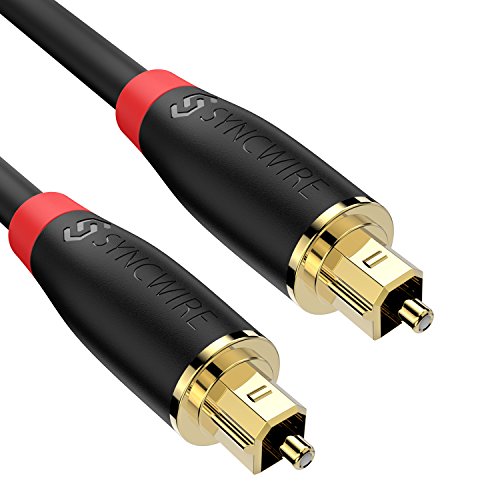The 5 Best Optical Audio Cables

If you've ever came across that trapezoidal port on the back of your DVD player or TV and thought, what the heck is that, you're probably not alone. Though once a popular way to transmit digital sound signals between devices, optical audio technology has fallen out of fashion in recent years, replaced by more convenient HMDI cables and ports. But fiber optic audio still has a place in today's world, particularly for anyone with a home entertainment system looking to get the highest-quality sound out of their equipment. We've rounded the best optical audio cables on the market, considering everything from construction quality to price.
1. KabelDirekt Optical Digital Audio Cable
KabelDirekt Optical Digital Audio Cable
Like HDMI cables, optical audio cables generally vary little in terms of quality, making it easy to shop for one. Still, there are exceptions — such as this option from KabelDirekt. The Toslink male-to-male model features components that represent a slight cut above the competition, including 24k gold-plated connectors and flexible PVC jackets. It also comes in several different lengths, but is still priced about the same as similar options.
Pros:
- Good length to width ratio
- Great for gaming
- Long manufacturer warranty
Cons:
- Slightly more expensive than similar options
- Connection may be loose on some devices
2. Syncwire Digital Optical Audio Cable
Syncwire Digital Optical Audio Cable
You don’t always need a 15-foot cable to connect your device in one place to a device in another, which is why the Syncwire optical cable comes in just two lengths — 5.9 feet and 10 feet. It’s a more compact alternative to our top pick, but still offers the same premium features, including gold-plated connectors and a soft and flexible PVC sheath that is also durable enough to withstand lots of wear and tear. It’s especially great for connecting a TV to a nearby DVD player or speaker system.
Pros:
- Corrosion-resistant materials
- High heat resistance
- Compatible with Dolby Audio
Cons:
- Only two length options
- A little pricey
3. BlueRigger Digital Optical Audio Cable
BlueRigger Digital Optical Audio Cable
Home entertainment systems often require a lot of wiring to connect all of their disparate parts, which is why this BlueRigger cable might be worth considering for the purpose. The standard model comes in lengths of up to 50 feet, leaving you plenty of cable to connect your speakers on one end of the room to your stereo at the other. Each optical connector is precision-polished to maximize their signal transfer accuracy, and are also sheathed in ergonomic connector grips that make them easy to handle.
Pros:
- Firm port connection
- Rated for in-wall use
- Universal compatibility
Cons:
- Connector plug is plastic
- Tips are bulky
4. CableCreation Optical Digital Audio Cable
CableCreation Optical Digital Audio Cable
If you’d rather not have a thick cable sneaking through the corner of your living room, get the CableCreation Optical Digital Audio Cable. It’s one of the thinnest audio cables out there, allowing it to be installed discretely or even hidden under carpet or wall paper, but at the same time is plenty sturdy, so you don’t have to be overly sensitive while handling it. Like other models on this list, it also features 24K gold-plated connectors that resist corrosion and ensure a smooth-flowing signal.
Pros:
- Affordably priced
- Backed by 2 year warranty
- Flexible design
Cons:
- Not the most durable option
- Connectors may be loose
5. AmazonBasics Digital Optical Audio Toslink Cable
AmazonBasics Digital Optical Audio Toslink Cable
You don’t need to have an expensive home entertainment system or be a serious audiophile to make use of this AmazonBasics Toslink cable. It’s one of the more affordable options out there, and is perfect for connecting everything from a CD player or Blu-Ray player to game consoles or a preamplifiers. And unlike more conventional electrical wires, which may suffer from electromagnetic or radio frequency interference, the fiber optic technology in this cable provides clearer audio in all environments, making it a great choice for any room of the house.
Pros:
- Comes in variety of lengths
- Connector grips offer easy handling
- Works with wide range of devices
Cons:
- Not the most durable option
- Connectors wear down over time
Frequently Asked Questions
What is a optical audio cable?
An optical audio cable is a cable that uses light and fiber optics to transmit audio signals from one device to another. Originally created by Toshiba as TOSLINK cables in 1983, they were intended to connect the company’s CD players to receivers, and later became widely used on other consumer electronics. In recent years, however, optical audio technology has been largely supplanted by HDMI, which carries both electronic video and audio signals in one cable — and yet optical audio still remains a standard on most devices.
Why do I need an optical audio cable?
The short answer to this questions is, you likely don’t. As previously noted, HDMI has largely replaced optical audio as the go-to technology for transmit audio, partly because of its convenience — HDMI carries both audio and video, so you only need one cable. But optical audio can still be a useful alternative, particularly if you’re trying to get the highest-fidelity sound out of your home entertainment system. Because optical audio uses fiber optic light, as opposed to electrical signals, to carry sound, it is often better protected from any potential radio frequency or electromagnetic interference, ensuring a smooth transmission.
About the Author
Why Trust Us
With the constantly shifting landscape in the world of technology, GameRevolution seeks to provide gamers and tech-enthusiasts with the information they need to select the right products for their needs. Since 1996, our experts have used their knowledge on all the latest gadgets – everything from headphones to standing desks – to help millions of people navigate specs and answer common questions.






